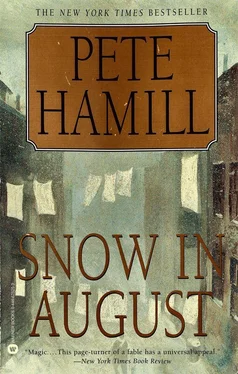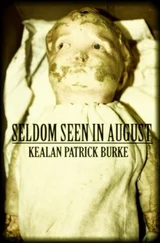Michael took a bite of the long, wide cracker. It was dry and tasteless.
“A Hershey bar it’s not,” the rabbi said.
He opened a cabinet and lifted a brown paper bag off a shelf. He placed it on the table in front of Michael.
“For you,” he said. “For your mother.”
Michael looked puzzled.
“Bread,” Rabbi Hirsch explained. “Regular bread. What we find in the store here in America. Hametz , we call it.”
Michael peered into the bag and saw some rolls and slices of rye bread.
“The Torah tells us to take away — what is it called? — leavened bread, or hametz , from our houses during the eight days of Pesach. You don’t do this, you don’t really observe Pesach. And to make matzoh even more important, the Torah tells us to find every scrap of hametz and scrub clean every part of the house. Some holy men, they say hametz is like pride: bread that’s all big and empty, like — what’s the word? — puffed up.”
He smiled in a mild way.
“Not me,” he added. “Bread is bread, except at Pesach.”
He handed the bag to Michael.
“So this is a bag of hametz ,” he said. “Still good. Give it to your mother.” He paused, as if trying to gauge the feelings of the Irish woman he’d never met. “Or you can do something else with it, if your mother, she would be insulted.”
“She’s always worried about insulting you ,” Michael said. “And she loves rye bread.”
“What a meshuggeneh world,” the rabbi said.
“Full of meshuggeners ,” Michael said, preening slightly as he used the Yiddish in a casual way.
As the rabbi cleaned the stove and the floor, with Michael helping him move the furniture to get at hidden shmootz , he told him about the fine seders they would have in Prague, at huge oaken tables crowded with generations of the Hirsch family. Michael could see the old people belching and farting on the couches and the children running back and forth, playing a game about hidden hametz , and cousins flirting and friends courting. All that, as the rabbi talked: and the reading of the Haggadah and the Four Questions and the dipping into the bitter herbs, all of them close and thinking they would go on for many more generations, the young burying the old forever.
“That was a happiness,” the rabbi said. “All gone away.”
“Will you have a seder here?”
“Maybe next year,” he said. “We save up some money, maybe. Your mother could come, and you, and who knows? Maybe some from the synagogue even.”
He tried to explain to Michael about how the last members of the congregation, old and bent, would wait at home and be picked up by their cranky children, the children embarrassed by the old people, and then be taken to strange places. Some of them would be flown to Florida. Some taken by car to New Jersey. Some would go by train to Long Island. But they would not be here. They would not be where they were needed.
“ Nu , by coming for a seder, they make all the hard part okay, the hard part of a year, the hard part of a whole life,” the rabbi said. “We are all together, means we survive again another year.”
But nobody was coming this year, and Michael could feel the loneliness seeping through the room like a fog.
“Maybe you could come to our house, Rabbi,” he said. “Have a seder with us.”
“No,” Rabbi Hirsch said firmly, and then sighed and grew lighter. “Next year, here we have seder. And we send to Jackie Robinson a note too.”
They talked a while longer, the rabbi scrubbing and dusting while Michael, for the first time, prepared tea.
“How come Passover and Easter come around the same time?” the boy asked. “You know, just before Opening Day?”
The rabbi smiled.
“Opening Day, I don’t know about,” he said. “But the other is simple. The Last Supper? You know, the famous painting? The supper that it happened just before Easter?”
“Sure.”
“Well, the Last Supper, it was a seder,” the rabbi said. “Jesus and his friends were together to give thanks for the freeing from Egypt.”
“You’re kidding!”
“No. So you better take this hametz home. The cleaning I got to finish.”
Michael lifted the grocery bag and went to the door. He paused with his hand on the doorknob and turned to the rabbi, who was opening a box of steel wool.
“Rabbi?”
“Yes.”
“I have a question.”
“Yes?”
Two questions. Not one. Two. Ask. No, don’t ask. Yes, go ahead. Ask. Ask.
Michael took a deep breath, exhaled slowly, and asked his first question.
“If God sent a plague against the Pharaoh to save the Jews,” the boy said, “why didn’t he send a plague against the Nazis?”
The rabbi was very still. His hands were limp against his sides.
“I don’t know,” he whispered in a voice powdery with despair. “I don’t know.”
He sounded like a rabbi who didn’t like God very much, and certainly didn’t love Him. And maybe didn’t believe in Him at all anymore. Michael did not ask his second question. He did not ask what had happened to the rabbi’s wife.
On Easter Sunday morning, Michael kept looking at his reflection in the store windows as he walked along Ellison Avenue. The priests told them at church that Easter was about Jesus rising from the dead, proving His immortality; everybody in the parish knew better. It was about new clothes. And in his new blue suit, white shirt, striped tie, and polished black shoes, Michael thought he looked older, more mature, whatever that vague word meant. Not yet a man, but no longer a boy.
He saw a girl named Mary Cunningham coming out of her building across from the factory. She was thin, with long brown hair, and was dressed in a light blue coat and a straw hat with plastic flowers around the crown. She smiled at him in what he felt was a new way. She was in his grade at Sacred Heart, but since the boys were separated from the girls at school, they only saw each other in the schoolyard or on the street.
“Happy Easter, Michael,” she said, smiling. Unlike some of the other girls in his grade, she didn’t wear braces. Her teeth were as hard and white as Lana Turner’s.
“Yeah, same to you,” he said.
“That’s a great suit,” she said.
“I like that hat too,” Michael said. “You going to mass?”
“Of course,” she said. “We have to go, right? But I gotta wait for my father and mother.”
His own mother had gone to the eight o’clock mass, which was all right with Michael. He didn’t want her walking him to mass as if he were a first grader.
“See you there,” Michael said to Mary Cunningham, and moved along more lightly in the bright spring morning. Suddenly Mrs. Griffin was calling to him from across the street. She was dressed in a tan coat and high heels and laughing hysterically.
“Michael, Michael, hey, Michael Devlin,” she shouted, looking both ways for traffic, then scurrying across to him. “You heard the news?”
“What news?” She was more excited than she had been when the war ended.
“Your mother didn’t tell you?”
“No.”
“My horse came in!” she said. “What’d I tell you? You gotta have faith! And it was all because of you, Michael. You told me your dreams, right? And we figured out some of them. But I couldn’t figure out that damned bowler hat. I thought about it for days and nights. Then yesterday I’m looking at the charts in the Daily News , I see there’s a horse running in the third at Belmont, and get this: his name is Bowler Hat! I say to myself, I say, God used Michael to give me a winner! I knew it in my bones. I knew it in my heart! God says to Himself, That Mrs. Griffin, she needs a few bucks, she needs a gas stove, she needs some nylons. So He sends a dream through you to me . I run across the street, and I put five bucks on Bowler Hat with the bookie, and son of a gun if it don’t come in by a lengt’ and a half and pays twenty-two to one. I’m rich, Michael!”
Читать дальше












